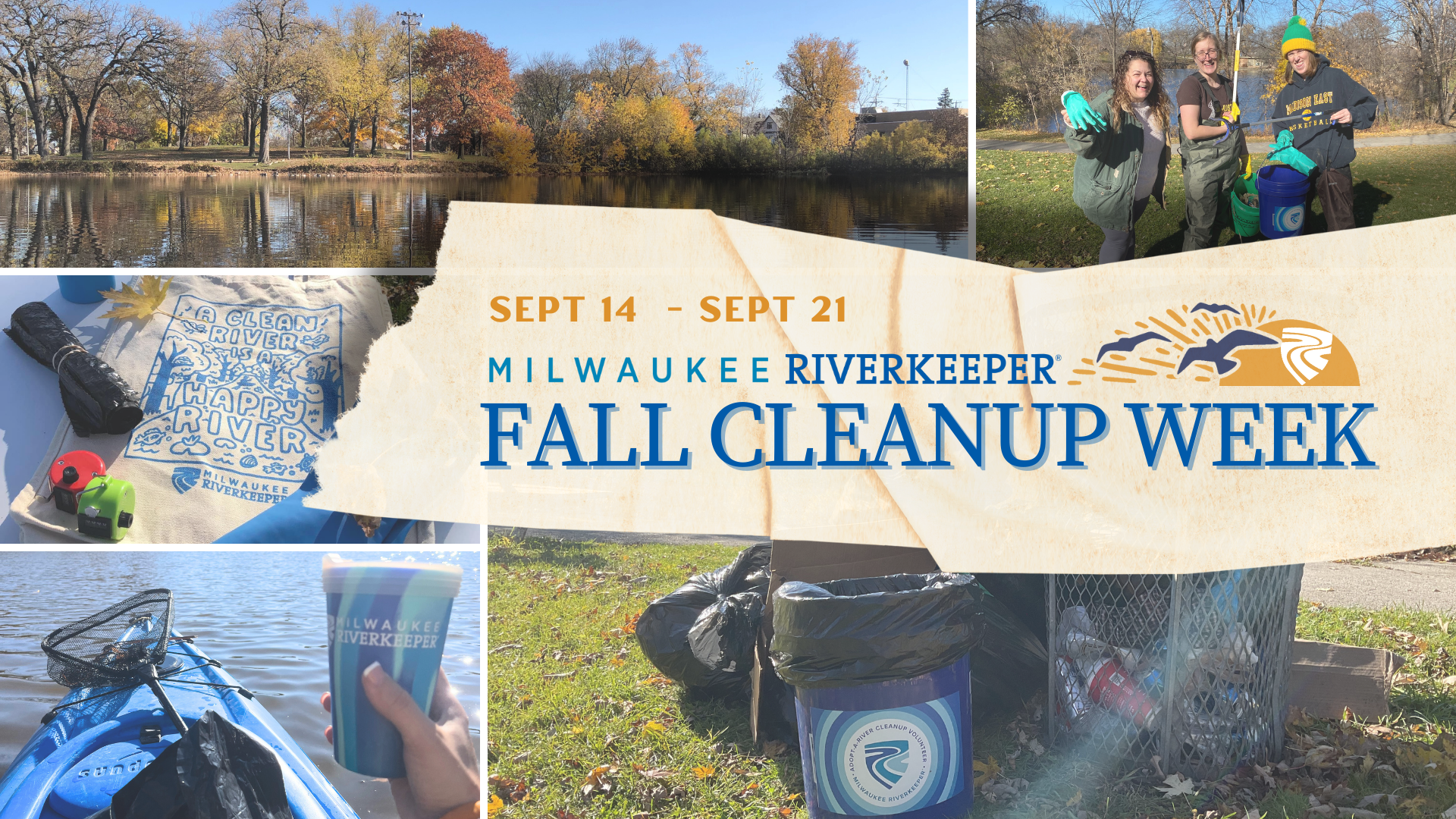Fall Cleanup

DATES
September 14th – September 21st, 2024
Let our rivers unite us this World Cleanup Day! Choose your own adventure on our rivers this fall with varying dates and locations to clean up the Milwaukee River Basin. We’ll provide everything you need – trash bags and gloves, and you provide the people power we need to pick up trash along our rivers.
Cleanup FAQs
What do I need to bring?
We recommend bringing a reusable water bottle and sunscreen, and wearing clothes that you can get dirty. Volunteers should also wear sturdy shoes and dress for the weather. We provide the cleanup materials you will need – gloves and trash bags, which should be returned to your cleanup lead after the cleanup.
What do you do with the cleanup data, and how can I contribute to more detailed data collection?
Cleanup data, specifically the number of volunteers that attend and trash weight, are important values we collect annually to show the impact of our event on a grander scale. This information is shared with groups like the International Coastal Cleanup to contribute to data collection worldwide, in order to understand our problem with trash.
Detailed data, numbers of specific types of trash, are also important, as it reveals the types of trash present in our river basin. This data is submitted to the same overarching groups, but we also use it locally to help solve our trash problem. For example, if we notice a spot has a high amount of cigarette butts, we can recommend that property owners install ashtrays. If you would like to contribute to detailed collection of data, you download and report through the Clean Swell app on your mobile device, or reach out to allie@milwaukeeriverkeeper.org to obtain a printable data card to bring along with you and share after the cleanup.
How do we remain safe during the cleanup?
Your safety is your responsibility and should be your first concern. The most important thing to remember is to KNOW YOUR LIMITS, both mentally and physically. If you come across something that exceeds your physical abilities or seems strange to you, leave it alone and seek assistance from someone more familiar with it.
While your site captain will review safety with you, we recommend ensuring that everyone in your group is familiar with our safety procedures before the event.
- It is preferable to conduct your cleanups in a group, not alone. If one person is hurt, others can get help. Also, always maintain voice and eye contact with a member of your group.
- Watch your footing on steep river banks, they may be soft or unstable. Avoid stepping on loose stones and rocks when possible.
- If planning a cleanup where the threat of drowning exists (steep banks, waterways, etc.), wear a life jacket and follow all safety regulations (Minnesota Boater’s Guide) and boater safety materials can be sent upon request.
- Children under age 16 should work with an adult. Parents should instruct their children and guests under age 16. Each child must be under supervision of a specific adult.
- Never pick up needles or hypodermic syringes! Wear gloves when handling all other sharp objects. If you encounter needles or syringes, mark the area in some way and notify your group leader so they can be properly picked up and placed in a labeled container. Do not reach into places that are blocked from your view.
- To avoid injury, avoid over-exertion and lift with your legs, not your back.
- Do not overfill or compact trash bags. Broken or jagged objects can pierce the bags and cause injury.
- Be conscious of the weather. This includes working only during daylight hours, being aware of potentially slippery areas, and being aware of possible storms. If you are caught in a lightning storm, it is important to find shelter in low-lying areas away from natural lightning rods such as trees and other tall objects.
- If you find a sealed drum, do not move it. Mark and report their location to your cleanup leader or local authority.
- Avoid dead animals.
How do we respect the neighbors and wildlife that call our cleanup site home?
- Clean only rubbish above ground. You may not only strain your back, but digging may create a bank erosion problem or a hazardous hole.
- Do not irritate or disturb other creatures living in the area, human or otherwise. Carefully leave the area if you are concerned, and report the location to your group leader or necessary authorities.
- Respect encampments in public spaces. Individuals experiencing homelessness have encampments at several of our cleanup sites. We do our best to protect their occupancies. These encampments often contain items of value to the individuals using them, and take a lot of effort to make. We want to be respectful of their items. We ask volunteers to leave everything as is, even if there is a question as to current occupancy.
How can individuals with different ability levels participate in the cleanup?
We want our Spring Cleanup to be as welcoming and accessible as possible for all river lovers. We are eager to accommodate and involve folks with differing abilities. A few things we currently offer to help accommodate are: trash grabbers, terrain information (upon request), and printed safety information and announcements at each site.
For folks unable to physically clean up to still participate in this year’s event, we welcome help with the following:
- Help with registration & check-in
- Supply distribution or collection
- Tracking trash data
We also encourage those interested in participating to bring a buddy or partner up with another volunteer. Our cleanups typically work well when folks work in pairs or groups so that one person can hold the trash bucket or bag, while others pick up trash.
